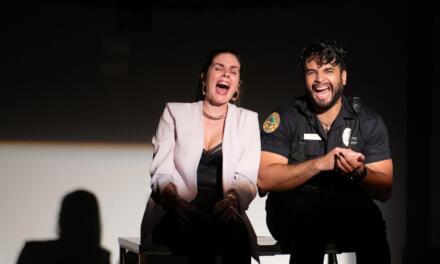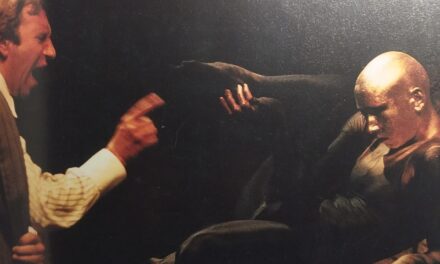Dmitry Troyanovsky, currently Assistant Professor of Theater Arts at Brandeis University, is a Russian-born director whose credits include the plays of Heiner Müller, Eugène Ionesco, Schimmelpfennig and other European playwrights, in collaboration with many national and international institutions. Since 2010, he has had a workshop and three productions in China, including his most recent works Sarah Kane’s 4.48 Psychosis and Marius von Mayenburg’s The Ugly One, which opened on April 7th, 2017. What’s it like for a Russian-American director to work with German and UK scripts in China? In this interview, Troyanovsky shares his experiences in these cross-cultural productions, along with his observation on Chinese actors as well as his reflection on theatre in the U.S.
Cheng-Han Wu: How did these two projects start?
Dmitry Troyanovsky: Initially I came to China about seven years ago on a teaching trip. People of the Shanghai Dramatic Arts Center (SDAC) were interested in the work I was doing on Carlo Gozzi’s The King Stag with the students at Shanghai Theater Academy (STA). They liked my style and approach and asked me to direct Sarah Kane. SDAC already did a production of 4.48 Psychosis in 2006. But for whatever reason, the artistic director felt it was time to bring another staging of the play to SDAC.
4.48 Psychosis was not on my radar. I had never been in love with the text. Since I did many expressionistic, modernist and postmodern plays, I could see why SDAC would consider it a good material for me. I said, “Let me think about it for a few days.” I decided to dissect the reason the play never appealed to me. I realized that it wasn’t a response to the text itself. It was my reaction to the productions I was seeing. Particularly, I remember being completely turned off by a French production of the play, a very high-profile production that came to BAM in New York some years ago, starring Isabelle Huppert. It was basically Huppert standing still downstage center and reciting every line in monotone for two hours. I thought this was so self-indulgent. I felt like I was held hostage by a person with psychological problems. Having to listen to their every word and utterance without a hint of anything visually interesting felt like torture. I didn’t see a thread of humor or anything else of real interest to the audience.
But was that really the fault of the play itself? Why such a self-serious approach? Why interpret the play as Kane’s suicide note? Is it even her own voice in the text? She was a playwright after all. Why is it that every review I read about the play is about how this is Sarah Kane’s suicide note? It’s a play first and foremost. A work of imagination. There’s a character or characters, who may or may not be like Sarah Kane. I don’t want to do a play about the suicide of a martyred playwright. The impulse to get away from such a solemn interpretation gave me an entry into the world of the play. Suddenly I saw a lot more creative freedom. If I could distance myself from the biography of the dead playwright, then I could do something inventive with the play. I called SDAC and agreed to work on the piece.
I guess 4.48 went well enough. They said, “We’re going to bring you back to the repertory.” A search for a new project started before I left Shanghai. One of the plays I proposed was The Ugly One. For many reasons, I think people here thought it was a good choice. Von Mayenburg was not well-known in China. I think this is the first time The Ugly One is done in Mainland China. The play’s style is very intricate and unusual, and its themes are universally relevant. Especially relevant in China, where there’s a complete obsession with plastic surgery.
CW: What were the early stages of the process like?
DT: Things haven’t evolved as radically as with 4.48. I came to the 4.48 process with a very open mind. I had a lot of flexibility, wanting to devise everything from scratch together with the cast. With The Ugly One, I started with a more settled sense of what the style, the look, and the aesthetic should be. So things have been coming together faster. After a week in rehearsal, I already had a sketch, a draft.
One aspect did evolve quite radically. Initially, I had a movement sequence in mind – an opening image. I invited a local modern dance choreographer to collaborate with me. What Yuan Hang did with this one sequence was so compelling that I asked him to expand his work from one movement sequence to five or six. They’re now interspersed throughout the show. Clearly, that changes the vocabulary of the production.
CW: Censorship from the government or even from artists themselves is always an issue in the theatre of China. Do you find it a hindrance as you develop these plays, which may be a little edgy for the authorities?
DT: I remember having a conversation the day before my first 4.48 rehearsal. I sat in a café with the producer, and I said, “Tell me honestly before I start, what are the potential problems with the censors? The answer was no explicit sex or explicit drug use. And then we never had a conversation about it again. Nor did the theatre have any issues with the censors. Maybe because 4.48 looks like an exploration of the inner psyche and doesn’t have any overt political meanings.
Like Sarah Kane, von Mayenburg has very few stage directions in his work. You can surmise from the text that there are moments in the play when people are fucking. That’s a red flag for the censors. But I’m not worried. I knew from the beginning that I didn’t want literal or naturalistic sex in The Ugly One because nothing about the play is literal. But even stylized sex, I was told, might be too much for the censors. So how was I to deal with that? I don’t want to self-censor. You know, I grew up in the Soviet Union, and the idea of theatre censorship to me is not something I’m very happy to go back to. At the same time, I have to respect my colleagues, who, unlike a guest like me, have to stay. They have careers, jobs, and families in China. I think I have ethical responsibilities not to compromise them. So I’ve abstracted the sexual acts. It isn’t an artistic compromise because it makes things much more interesting – metaphoric. I am always seeking metaphors.
CW: Could you be more specific about this?
DT: For example, instead of a literal kiss, I have one actor putting a hand on another actor’s mouth. A gesture that has tenderness and hunger in it. And then a third actor picks up a live microphone and does a very exaggerated sucking sound, like a deep kiss, followed by more sounds imitating frenetic, orgasmic fucking. I think it’s going to work.
It’s less literal moment of sexual passion. At the same time, I realize, that it can slyly comment on the idea of censorship here. Because the gesture of putting a hand over someone’s mouth looks like you’re silencing them.
CW: So the moment becomes a little bit self-ironic.
DT: Yes.
CW: It’s interesting that censorship turned out to be part of your inspiration.
DT: Yes, but that’s not unusual. Artists who work in censorious and repressed countries will always admit to this paradox. The Soviet Union was notorious for it. Even if you look at American artists, or American playwrights from the 40s, 50s, and 60s — Tennessee Williams and Edward Albee, for example. They had to make some things about sexuality more sub-textual. But I would argue that quality of their work did not suffer. Complications can be good for art.
On a somewhat related note, it can be healthy sometimes not to settle for the first thing that comes to your mind. Artists need to know how to reject the first draft or the first idea. In American theatre, possibly because of the legacy of the Method, there’s an emphasis on improvisation, being open to impulses and the subconscious (or what you think comes out of the subconscious). We have an illusion that the first thing that springs to our mind comes out of a deep subconscious place, some profound well of creativity. That it’s truly impulsive. But oftentimes what seems like an original impulse has already been through a process of internal modification. Affected by prefabricated cultural images that surround us. So I think it might be useful to reject the first solution or the first draft.
CW: Did you do anything to make the plays more accessible to local audiences, like changing lines, or putting onstage any images associated with Chinese people or their lifestyles?
DT: No. First of all, it would be very presumptuous of me, as a foreigner and someone who doesn’t speak Chinese, to decide what makes something more accessible. Sometimes, if I sense that there’s a problem onstage, I may double check with my translator and see if there’s a potential mistranslation. For example, I found out that Sarah Kane’s “fuck, fuck, fuck” was translated as something akin to “damn, damn, damn.” So we tried to change that in rehearsal to give a stronger, more offensive, more in-yer-face sound. But very rarely do I feel that I have the right to assume what will speak to the Chinese audience.
Also, I think the reason they invite me, or any foreign director, is because they are interested in our difference – our style, theatrical language, and our point of view. That’s what the audience wants to see. If they want a more Chinese point of view on The Ugly One, they can have a Chinese director to do it. I can only deliver what makes sense to me. Now, having said that, since I’m working on the Chinese soil, with actors who speak Chinese, with people who breathe Chinese air and culture, my work will undergo some adjustment. It’ll always be a more Chinese production of the play than the one I would do in America. In the process of crossing cultures borders, a hybrid vision becomes inevitable. You are affected by the new context.
CW: Is it because of their acting style or the way they express?
DT: I’m not sure if I would say it’s something as concrete as the acting style. It’s more unspoken. Something in the atmosphere. Maybe the way people communicate with each other or relate to each other physically. Various cultural habits. These things are hard to explain, but they exist. So if you’re working in a Chinese theatre with Chinese actors, and then incorporate the reactions of the Chinese audience, no matter what you do, the production will have a more Chinese flair than your production of the same text in another country. That’s why I don’t force myself to make conscious adjustments. Those adjustments are going to happen on their own.
Now speaking of the Chinese acting style, something that I’ve observed, and this is very arguable and I realize people might attack me for it (because it’s probably a generalization) is that the Chinese think of tragedy and comedy as very distinct forms, at least the actors in the so-called “spoken drama” theatre. They approach tragedy with a very lyrical style, and they approach comedy with broad burlesque-like strokes. I’m not interested in either one. In 4.48, I tried to invent a mixed style. And I think, to some extent, I succeeded in pushing actors away from soft lyricism. I emphasized that the play is not about depression. It’s called 4.48 Psychosis after all. Not 4.48 Depression. In my mind it implies a certain ecstatic quality, demanding stylistic vibrancy. The previous SDAC production, which I saw on the video, embraced the depressive aspect. A quiet desperation of the persona in the play. It was a tasteful, understated production. Personally, I think that too much good taste can backfire. Once, semi-jokingly, I came up with a formula: “ Good theatre is 80% good taste and 20% bad taste.” I was more interested in the physical, carnivalesque, buoyant existence on stage. If you talk about death and pain it doesn’t mean you have to be solemn about it at every moment of the show. I wanted the actors to find as much physical expressivity as they could. I felt the pain would come through if I didn’t try so hard to make it all about suffering. That’s where games with form and shape enter.
A few days ago, I participated in a talk organized by SDAC in order to put contemporary German drama into context. The panel included me and two Chinese theatre professors, one from Shanghai, one from Nanjing. Both of them agreed that today’s Chinese audience is too focused on the story, the plot. According to these experts, the spoken drama audience in China has not yet learned to grapple with abstraction and formalist theatre. In America, we also tend to be interested in the narrative a little too much. It’s good to understand that theatre is not always about the narrative. There’s a more profound felt experience in the theatrical event.
On the other hand, I find the audience in China to be very open. They’re young and hip and intellectually curious. Theatre for them isn’t just some uncool thing their grandparents do. Most American theatres would kill for this demographic.
CW: How did you examine the nuances of the lines which the actors deliver in a language unknown to you?
DT: Well, it’ll be foolish of me to pretend that I can be as aware of the nuance in Chinese as I could be in English or Russian. I can sometimes tell from the tone or the body language that something isn’t working. But the subtlety of verbal irony, for example, eludes a foreign director. It’s a limitation, which you either accept (and deal with) or chose not to do the work. And you have to trust your actors. You really have to rely on their professionalism, intelligence, and taste. I think when I did 4.48, I almost approached it as opera.
CW: How so?
DT: Because in opera the nuance of the language isn’t as important. You direct the body, you direct rhythms. In 4.48, I set the rhythms right away with live music. I started to choreograph. I approached it in a very formalist way. Once I had the form, I went back to deal with the nuances. Especially with the leading actress, Xu Man Man, we did a lot of textual work. We tried to dig deeper into lines and into the tone. For me, it was important to get away from easy sentimentality. I didn’t want Xu Man Man to beg for pity or tears from the audience. I hope that we succeeded.
I also ask people in the rehearsal room: “How does this scene work?” or “Is the irony being conveyed?” or “Is the tone right?” The texts I tend to choose for China are easier in this kind of approach and direction because the characters, such as those in The Ugly One, are not psychological beings. They are not Chekhovian people. These characters don’t become deeper and grow during the rehearsal process. The focus in the rehearsal of The Ugly One is not finding the depth of the individual characters but finding the depth of the play and its themes.
CW: According to my previous experiences working with actors in China, many of them tend to delve into psychoanalysis.
DT: Well, I try to get away from endless discussions about character. In A Director Prepares, Anne Bogart points out that both actors and directors can have false comfort in the table work process. You know, it’s interesting, funny, you discover things, and you feel like you’re making progress. Some people spend weeks around the table. And then when you’re finally on your feet, it turns out that nothing you talked about actually translates into the work. I don’t want to give myself that false comfort. I want to test things right away. I want to plunge into the unknown even if I don’t feel comfortable. It’s kind of terrifying. A sink or swim process. But the sense of terror is what pushes me to find solutions. I’m sure it’s terrifying for the actors too. But fear can be very productive. Maybe some Chinese actors do love to indulge in conversations about psychology. But we don’t do that in my rehearsal. For me, it’s kind of passé. You have to engender meanings through action and physicality. You learn by doing.
CW: Do you think being a foreigner is a benefit for you throughout the rehearsal process?
DT: Yes, to a degree. As I said, if they invite a foreign director, it’s because they want something different. Perhaps you can even get away with more in terms of what’s allowed by censors.
I must say that it is quite humbling to be in the rehearsal room with my Chinese actors. I realize that there’s an extra challenge for them in working with a director who doesn’t speak their language. Yet I can see them embracing my ideas. I’ve tried to absorb their openness and flexibility.
CW: Did you choose the actors, or did they choose the actors for you?
DT: I chose the actors. We had an audition, a virtual audition. I looked at videos and resumes, and then we had video conferences. It’s an imperfect process. I was looking for actors who are open to new ideas. I remember when I was going through the audition process of 4.48, I spoke to a lot of actors in the theater, and I was struck by a certain complacency. A couple of company members were basically snobbish. “You know I don’t really dig this kind of play” or “Well, to be honest, I’m not sure if I’m truly interested. This material isn’t my cup of tea.” I was thinking “why are you even here? why are you talking to me then?”
It’s very different the U.S.. American actors are dying for work because most of them are freelancers. Actors in Chinese repertory companies draw a basic salary whether they appear in shows or not. It reminded me of the time when I directed my first professional production in Moscow at the Pushkin Theater, a big repertory company. Some of the older actors were not interested in being cast. They wouldn’t say so to my face. But I still got the message: “You are young, you are unknown, you are a directing student while I am a celebrated actor and I don’t know if this project is going to be worthy of me.” So now I try to identify actors who are really open to new material and to an unfamiliar director. I prefer actors who search and experiment, who are unafraid to do something different. I am very lucky to have found a group of such artists at SDAC.
CW: In terms of the productions, is there anything lost or gained in translation?
DT: I think you have to ask the audience. I’m too close now to the process.
I think there are some limitations that may have to do with production values. We’re trying to incorporate live video feed into The Ugly One. If it works it will be the first time for SDAC. But my design team from the U.S. and I don’t know how it’s really going to work out with the technology available to us. That kind of thing sometimes requires compromise or adjustment.
CW: What play will you choose to do if you have another chance to collaborate with Chinese actors in the near future?
DT: We haven’t talked about it in detail yet, but I think SDAC might want me to do an adaptation of a Russian novel. That could be fascinating. I’m also discussing a project with an opera company.
This post was written by the author in their personal capacity.The opinions expressed in this article are the author’s own and do not reflect the view of The Theatre Times, their staff or collaborators.
This post was written by Cheng-Han Wu.
The views expressed here belong to the author and do not necessarily reflect our views and opinions.


















